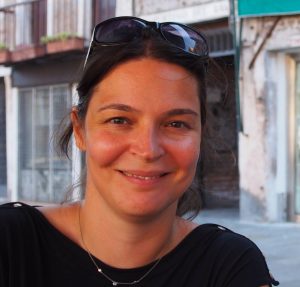About Us
The COVID-19 pandemic has forced the world to critically evaluate the ways in which state-of-the-art technology, and in particular Artificial Intelligence (AI), can be leveraged to dampen the impact of current and future threats. While AI is in our name, we are dedicated to examine many technologies involving intelligent machines, optimization algorithms, computer simulation, and other tools. The Rutgers AI & Pandemics Initiative is organized is organized around a transdisciplinary group of faculty including over 30 faculty members from Public Health, Psychiatry, the Cancer Institute of NJ, the DIMACS Center, The Rutgers Center for Cognitive Science, Computer Science, Mathematics, Statistics, Engineering, Law, Business, Library and Information Science, Urban Planning and Public Policy, Philosophy, English, Institutes related to homeland security and secure communities, and others.
The group’s work is organized around three questions:
(1) How can AI help in the current pandemic?
(2) How can AI help prevent, predict, and mitigate future pandemics?
(3) What ethical issues arise from the application of AI to pandemics?
AI technologies are proposed and deployed to combat COVID-19, including disinfecting robots, self-driving vehicles for deliveries, face recognition to identify infected contacts, drones to enforce quarantines, machine learning for drug discovery, and more. Such automation benefits society overall, while raising legitimate concerns about loss of privacy and diminished human rights that extend past the emergency. The Initiative brings together technologists, who can develop tools that can help mitigate effects of pandemics, with ethicists and health professionals who will evaluate the ethical ramifications and help guide the application of the corresponding technology. This group will serve as a broad umbrella of researchers addressing key issues related to AI and pandemics. Examples of such issues are: (1) contactless production and delivery, (2) tele-medicine and patient care, (3) privacy-conscious surveillance, contact tracing and disease testing, (4) redesign of COVID-19 supply chains, (5) metrics of physical and mental health under social distancing, (6) early warning of new disease outbreaks from multi-modal data, (7) semi-autonomous disinfection and contaminated waste management.
In the short-term, we have formed smaller, targeted teams (working groups) laying the foundations for the proposed transdisciplinary effort, while enhancing a transdisciplinary dialogue about all of these issues and preparing for groups to apply for larger external funding awards.
 David Pennock, Computer Science and DIMACS – SAS
David Pennock, Computer Science and DIMACS – SAS Sara Pixley, RuCCS – SAS
Sara Pixley, RuCCS – SAS Fred Roberts, Mathematics and DIMACS – SAS
Fred Roberts, Mathematics and DIMACS – SAS Vivek Singh, Library and Information Science – SCI
Vivek Singh, Library and Information Science – SCI Kostas Bekris, Computer Science – SAS
Kostas Bekris, Computer Science – SAS Roseanne Dobkin, Psychiatry – Rutgers NJ Medical School
Roseanne Dobkin, Psychiatry – Rutgers NJ Medical School Alok Baveja, Supply Chain Management – School of Business
Alok Baveja, Supply Chain Management – School of Business Sunita Chaudhury, CINJ
Sunita Chaudhury, CINJ Weiwei Chen, Supply Chain Management – School of Business
Weiwei Chen, Supply Chain Management – School of Business Midge Cozzens, DIMACS – SAS
Midge Cozzens, DIMACS – SAS Kristin Dana, Electrical and Computer Engineering – ENG
Kristin Dana, Electrical and Computer Engineering – ENG Elsayed Elsayed, Industrial Engineering – ENG
Elsayed Elsayed, Industrial Engineering – ENG Lazaros Gallos, DIMACS – SAS
Lazaros Gallos, DIMACS – SAS Lauren Goodlad, English – SAS
Lauren Goodlad, English – SAS Michael Greenberg, Bloustein School or Planning and Public Policy
Michael Greenberg, Bloustein School or Planning and Public Policy Elie Honig, Inst. for Secure Communities
Elie Honig, Inst. for Secure Communities Ying Hung, Statistics
Ying Hung, Statistics Colin Jager, English – SAS
Colin Jager, English – SAS Muibbasir Kapadia, Computer Science – SAS
Muibbasir Kapadia, Computer Science – SAS Casimir Kulikowski, Computer Science, SAS
Casimir Kulikowski, Computer Science, SAS Ned Lattime, CINJ
Ned Lattime, CINJ Ava Majlesi, Inst. For Secure Communities
Ava Majlesi, Inst. For Secure Communities Amélie Marian, Computer Science – SAS
Amélie Marian, Computer Science – SAS Brian McLaughlin, Philosophy – SAS
Brian McLaughlin, Philosophy – SAS Bill McLaury, Supply Chain Management – School of Business
Bill McLaury, Supply Chain Management – School of Business Ben Melamed, Supply Chain Management – School of Business
Ben Melamed, Supply Chain Management – School of Business Konstantin Mischaikow, Mathematics – SAS
Konstantin Mischaikow, Mathematics – SAS Gandalf Nicolas, Psychology – SAS
Gandalf Nicolas, Psychology – SAS Rebecca Reynolds, Library & Info Sci. – SCI
Rebecca Reynolds, Library & Info Sci. – SCI Anand Sarwate, Elec. & Computer Eng. – ENG
Anand Sarwate, Elec. & Computer Eng. – ENG Patrick Shafto, Math & CS, RU Newark
Patrick Shafto, Math & CS, RU Newark Vincent Silenzio, Urban-Global Public Health – School of Public Health
Vincent Silenzio, Urban-Global Public Health – School of Public Health Matthew Stone, Computer Science – SAS
Matthew Stone, Computer Science – SAS Pamela Valera, Urban-Global Public Health – School of Public Health
Pamela Valera, Urban-Global Public Health – School of Public Health Jaideep Vaidya, Business School
Jaideep Vaidya, Business School Jerome Williams, Marketing – School of Business
Jerome Williams, Marketing – School of Business Caroline Young, Law School (and Director of the Law Library)
Caroline Young, Law School (and Director of the Law Library) Joseph Charette, Executive Director of Dining Services
Joseph Charette, Executive Director of Dining Services Steven Keleman, Director, Rutgers Office of Emergency Management
Steven Keleman, Director, Rutgers Office of Emergency Management Felicia McGinity, Executive Vice Chancellor for Administration & Planning
Felicia McGinity, Executive Vice Chancellor for Administration & Planning